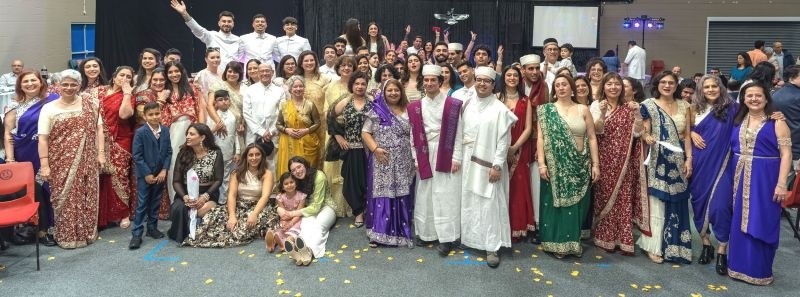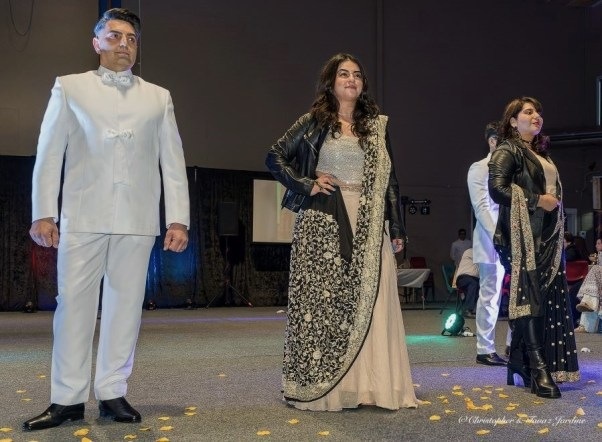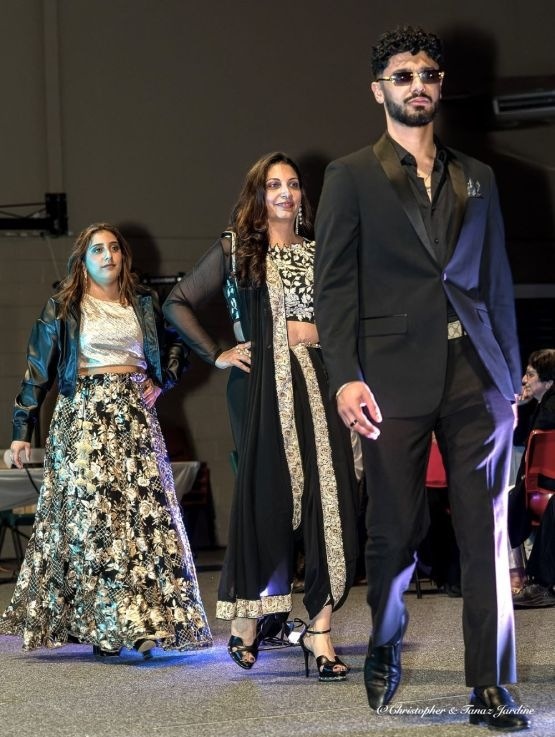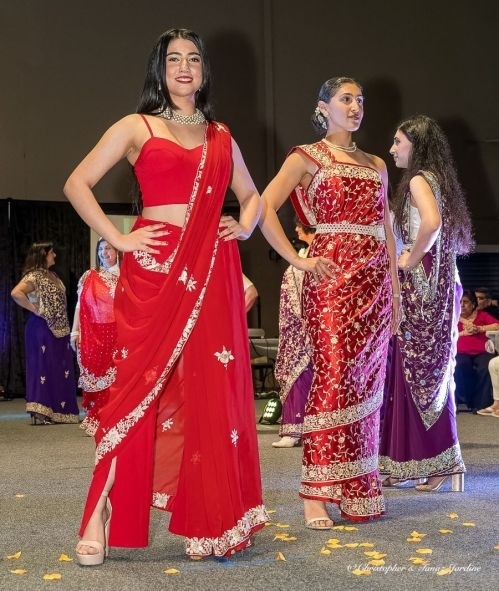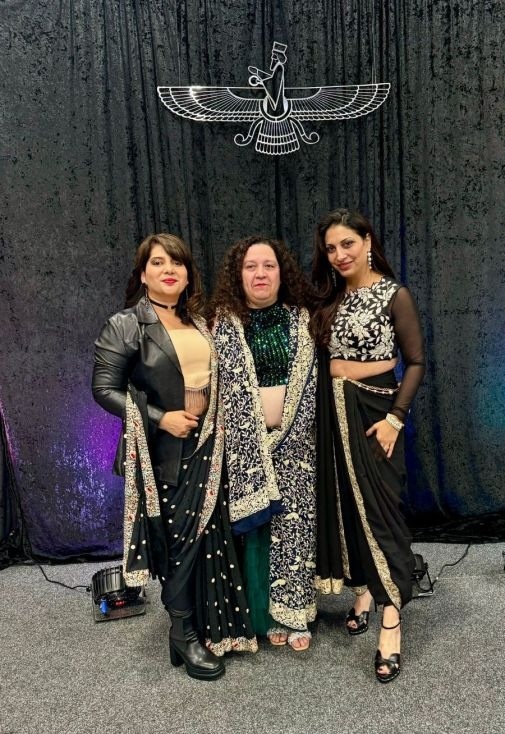The spirit of unity and compassion runs through the Parsi Community everywhere: The Parsi Community in Auckland is predominantly resident in East Auckland
(Supplied Photo of Participants at ‘Jamva Chalo Ji,’ held in Pakuranga on July 17, 2024)
Article by Venkat Raman | Indian News Link NZ
The need to foster cultural and traditional values among the youth and the magnanimity of the people are taking the Trustees and Members of the Auckland-based Zoroastrian Community Trust of New Zealand (ZCT) closer to their cherished goal of establishing a multiplex, complete with a Community Centre and Dare-be-Meher (the Sacred Place of Worship of Parsees).
Trustees Navzad Cooverji and Taimur Badhniwala believe that the Project must now be taken up seriously to cater to the growing needs of the community.
“We are happy that ZCT has been able to mobilise its finances through savings, collections and contributions, but the high cost of building and maintaining a multi-purpose, state-of-the-art Community Centre will entail greater efforts. We need to raise funds through several projects and programmes in the ensuing years,” they said.
Mr Cooverji and Mr Badhniwala are proud of their community and the readiness of businesses and individuals to support their cause. Zoroastrians (Zoros), who are known as Parsis, are a dwindling community with less than 200,000 around the world and about 1000 in New Zealand, found mostly in Auckland. Preservation and growth are therefore twin aspects of their existential responsibility. These factors drive the spirit of unity and fraternal bond.
Standing up to the Community: (Supplied Photo of Pirzad Rustomjee, Fereshteh Irani and Shahnaz Rustomjee at ‘Jamva Chalo Ji,’ held in Pakuranga on July 17, 2024)
About Zoroastrianism
Founded more than 3000 years ago, Zoroastrianism is one of the oldest monotheistic religions predating Christianity and Islam by many centuries. Details of its origin are imprecise.
The Prophet Zoroaster, also known as Zarathustra, is revered as the Founder of the Faith, which became dominant in Persia before Arab Muslims conquered the region in the Seventh Century.
Wary of persecution, many Zoroastrians left for destinations in India, notably Mumbai and Gujarat. India’s Zoroastrian population, known as Parsis, is larger than that of any other country, though the numbers there are declining while they increase in North America, Britain, Australia and New Zealand.
At its core, Zoroastrianism emphasises a never-ending battle between good and evil, a contest between the religion’s God, Ahura Mazda, and an evil spirit, Ahriman. Believers have the freedom to make good or bad choices; they were exhorted by Zoroaster to think good thoughts, say good words and do good deeds.
Scholars say that these tenets and other aspects of Zoroastrianism had a significant influence on other religions, notably Christianity, Islam, Judaism and Buddhism.
Parsis excel in every walk of life (Supplied Photo of Friyan Irani, Ruzvin Elavia and Aryaan Contractor at ‘Jamva Chalo Ji,’ held in Pakuranga on July 17, 2024)
Indiana University Central Eurasian Studies Professor Jamsheed Choksy said that such ideas have fundamentally shaped Western Society.
“Fighting the good fight, a purpose of existing to do good, to make the world flourish, to work together, to respect and love each other … all that goes back to Zarathustra,” he said.
Traditional temples house a sacred fire intended to burn perpetually. Another ancient custom: raised, circular structures known as Towers of Silence, where dead bodies were placed to decompose rather than being buried.
Prominent Parsis
In the Indian context, Parsis have distinguished themselves as businesspersons (Jamshed Tata, JRD Tata, Ratan Tata, Godrej, Wadia), military personnel (General Sam Manekshaw), Scientists (Homi Bhabha), composers (Zubin Mehta), authors (Rohinton Mistry, Firdaus Kanga), politicians (Dadabhai Naoroji, Feroz Gandhi, Smriti Irani).
A Culinary and Sartorial delight
The inherent spirit of the Parsi enterprise was apparent at the ‘Jamva Chalo Ji,’ a Food Festival held at the Pakuranga Leisure Centre in East Auckland on July 17, 2024. About 300 men, women and children attended the event at which then Transport Minister (now Health Minister) Simeon Brown was the Chief-Guest along with the members of the Howick Local Board and community leaders.
Red is an auspicious colour for Parsis: (Supplied Photo shows Freya Irani and Zoish Chichgar at ‘Jamva Chalo Ji,’ held in Pakuranga on July 17, 2024)
Several couples and youngsters participated in a fashion show that highlighted the sartorial resplendency of the Parsi and Gujarati wardrobe, bringing to the fore the cultural rhapsody of a community that is anxious to emphasise its self-assertion.
“This is a convenient venue but not large enough to invite the extended members of our Indian community and brothers, sisters and friends of other communities. We need to build a Community Centre for which we need to build our finances,” Mr Cooverji and Badhniwala said as they addressed the audience. Their appeal for finance was met with a thunderous response.
“We believe that there is ample support and we can boldly undertake the related tasks including identifying appropriate land or an existing property that can be converted to suit our requirements.
The objective is to build on the existing funds and we propose to organise fundraising programmes soon,” they told Indian Newslink later.
Parsi women are torchbearers of Erudition and Talent: (Supplied Photo of Shahnaz Rustomjee, Paricheher Contractor and Ruzvin Elavia at ‘Jamva Chalo Ji,’ held in Pakuranga on July 17, 2024)
An Expressed Objective
Mr Badhniwala said that the primary purpose of forming the Trust 17 years ago was to oversee the establishment of a Community Centre and a Dare-be-Meher.
“Zoroastrians in New Zealand consist of senior and young migrants who have come mainly from India to make New Zealand their home. We need our own facilities for worship, celebrating festivals and other observances to foster a sense of community. The proposed Community Centre will also help us preserve, project and promote our culture and religion among the current and future generations,” he said.
In 2007, it was proposed to the Zoroastrian Community of New Zealand that a community centre be established in Auckland. The purpose of this centre would be to provide a place for communal worship, as well as a permanent venue for Zoroastrian functions, get-togethers and community events, in turn advancing and preserving the Zoroastrian culture and faith amongst our families, our youth and all our future generations to come.
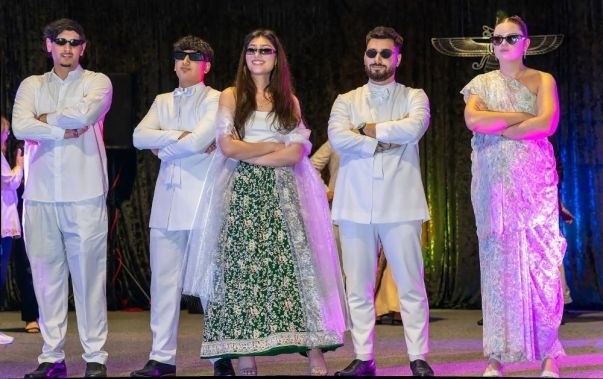
The future is as bright as White: (Supplied Photo of Behzad Karkaria, Jehan Rustomjee, Tia Badhniwala, Sohrabh Badhniwala and Lauren Adamson at ‘Jamva Chalo Ji,’ held in Pakuranga on July 17, 2024)
Among the aims and objectives of the Trust are to have (a) a permanent home for community functions and activities (b) a permanent home to hold regular classes for Zoroastrian education of children and adults (c) a permanent venue for the Zoroastrian youth and senior citizens to interact and socialise (d) a permanent home for a library and learning centre and (e) a place of worship where religious ceremonies can be held without limitations or restrictions.
“The Parsi values act as cornerstones by providing stability, progress and growth to the Zoroastrian community in New Zealand. In essence, our motto is ‘Success through Progress.’ We look forward to the contributions and donations of businesses, benefactors, philanthropists and communities to help us to establish our Community Centre and Temple,” Mr Badhniwala said.
Donations can be remitted to the ZCT Bank Account 03-0104-0471798-02. Please quote your name under Reference. Further information can be obtained from Taimur Badhniwala on 027-5093303 or Navzad Cooverji on 021-2302603; Email (zcentre@gmail.com).
-With Reporting by Farida Master

